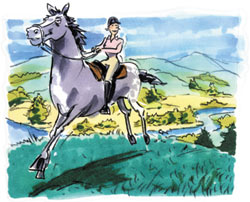
Surely it's not as desperate as all that? Haertel is
adamant that it is.
One of Haertel's board members, Sophie Clifton, cites as
anecdotal-but powerfully convincing-evidence the history of
Phoenix, Ariz., where it was common to see people riding
horses within the city limits only a few years ago.
"Today, rural land well outside of Phoenix, the kind of
scrub desert where you can ride for days and days, is being
developed at the rate of an acre an hour," she says
It's not just trail rides that ELCR, a partner of the
prestigious Conservation Fund, is seeking to preserve. It's
land used for stabling, showing, training, polo, hunting and
eventing. All of it is at grave risk of becoming an
endangered species.
Haertel believes her group has a lot of catch-up work to
do in order to wield the clout of other, better-known land
preservation groups. A lot of conservation efforts, such as
American Farmland Trust, have been in the public
eye-favorably-for decades.
"Today, when you think of conserving land you think of
farmland or wildlife," she rues. "In order to change that,
the first thing we need to do is to get one group of riders
working with another. "We're trying to create a unified
voice for the entire industry," says the long-time advocacy
worker.
"We're bigger than the motion picture industry, but you'd
never know it because we're not speaking with one voice.
Dressage riders don't talk to trail riders who don't talk to
hunter/jumpers."
But the news isn't all dire. Haertel has found the
economic clout of horse people can have a positive effect on
grassroots efforts to maintain equine right-of-ways. To a
greater or lesser extent, farriers, feed stores, tack shops,
carpenters, hardware stores, farmers and truckers are all
part of the equation.
"Taking action is usually rewarded," she says. "It's like
anything else; if you're organized, you've got a lot better
chance of effecting change in your favor," she says.
ELCR can provide the name of land trust(s) operating in
your area and has a manual that outlines several methods for
gaining equestrian rights at little or no cost. To learn
more or to receive their Open Space Access Survey, contact
ELCR by writing P. O. Box 335, Galena, IL 61036, calling
(815) 776-0150 or visiting their website, www.elcr.org.
| Be a good neigh-bor
Want to do your part to ensure you and your
children will have plenty of areas for trail
riding, fox hunting, eventing, training and
padlocking? Follow these tips:
- "The first and best thing a rider can do
is to join with local organizations that are
working to preserve access," says Kandee
Haertel. Saddle clubs or other groups that
help maintain equestrian sites, such as
county fairgrounds, are usually good
starting points. Once you join, become
active in the group.
- If you want to go a step farther, join a
statewide group. Encourage groups, which
tend to have membership based on discipline,
to communicate with each other. Share
success stories and work together on
specific issues.
- Do your best to be a good neighbor,
especially if you're the only horse owner
around. Keep your place neat. You don't like
flies, but your non-horsy neighbors hate
them. And they'll blame you for every one
they find in their homes. Keep your fences
intact.
- When you're out riding and see your land
manager-or whoever is in charge of your
trails or showgrounds-smile. Wave. Stop and
talk if you can. Thank him or her for
letting you use the facility. Describe how
much you enjoy the grounds and what a
beautiful place it is. Do not start any
conversation with, "You know there are some
terrible potholes over there."
- If you come to a gate and it's closed,
close it behind you. What do you think, you
were raised in a barn?
- When you trailer out somewhere, pick up
your horse's manure. To non-equestrians,
manure is not as acceptable as it is to you.
To them, it is not reprocessed grass. It is
massive quantities of poop. "And I hate to
have to say this, but it happens more often
than you'd imagine," says Haertel. "Pick up
manure when it is in a picnic area."
|

|